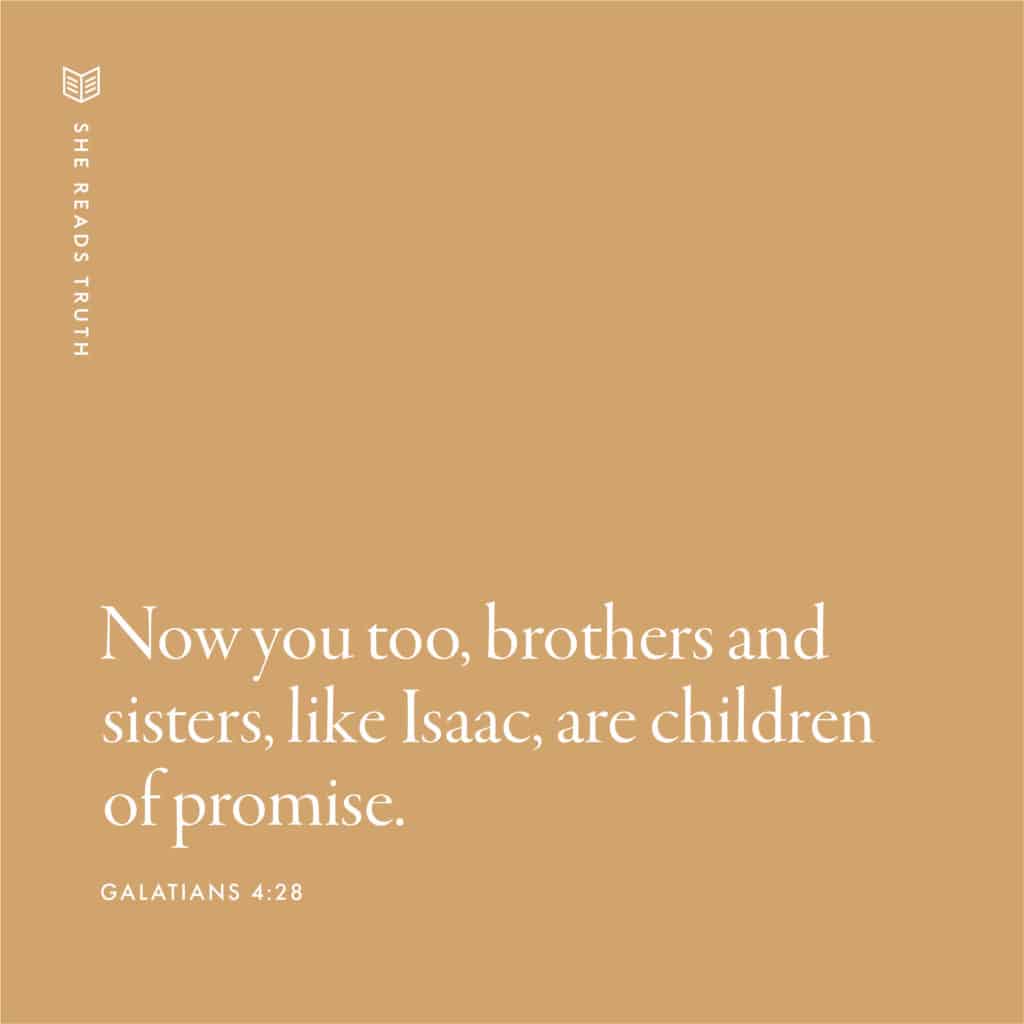Sarah and Hagar: Two Covenants
Open Your Bible
Galatians 4:21-31, Genesis 16:1-16, Romans 9:6-8, Hebrews 12:18-24
BY Rebecca Faires
I think a lot about how the circumstances of our birth affect our futures. I bet Isaac and Ishmael did too. Their mothers, Sarah and Hagar, represent the old and new covenants. Sarah was Abraham’s wife, and when she didn’t conceive, she impatiently sent her servant to conceive in her place. Her servant Hagar bore Ishmael. Sarah later bore Isaac. God established the old covenant to teach us our need for a Savior. When Christ came, He fulfilled the law and the covenant. And he ushered in the new covenant of grace.
This was an abstract and new concept for the Galatians, and the Judaizers were all over them—trying to draw them back into confusion and slavery to the law. Paul is trying to help us understand by putting it in terms we are familiar with: human efforts to solve divine problems. It’s in our nature to try to settle things on our own terms. And the ancient Mediterraneans of Galatia couldn’t fulfill the law any more than we can. Paul demonstrated that the Judaizers, in deceptively drawing the Galatians to rely upon the law of Moses for their justification, are not acting in accord with the promise given to Abraham, but are turning from that promise.
Salvation does not come to us by the works of the law, even the law of Moses, which was literally given by God at Sinai. The pursuit of salvation by works of the law is not sufficient. The end result, as it was for Ishmael and Hagar, is to be driven out. Why? Because the only means of attaining the inheritance promised to Abraham, of true fellowship with God, is by faith. To rely on deceit, or only on the law, is to reject true salvation and freedom, which comes only by faith in Christ.
Neither Isaac nor Ishmael could control the circumstances of their birth. Paul is reminding us that our identity is not established by what we have done or will do. It is not something we can earn. Rather, our identity is fixed with Christ. This should have a radical impact on how we live and think. We are simultaneously set free from the exhaustion and impossibility of earning God’s favor, and filled with gratitude for the inheritance we have so freely received. This gratitude, not the threat of the law, is the motive for Christian living.
Sarah represents the covenant of faith and grace, but Hagar represents the covenant of failed human effort. Ishmael was Abrahams and Sarah’s plan, but Isaac was God’s plan. The law is not a means to leverage salvation. Isaac received the inheritance of the promise. “Now you too, brothers and sisters, like Isaac, are children of promise.” (Galatians 4:28)

30 thoughts on "Sarah and Hagar: Two Covenants"
-
Shawn, your comments resonate with me so much.
Shawn- I too grew up in a single-parent home and was raised to be really independent, fix-all-the-things and do-all- the-things. I’m 36 now and I still struggle with leaning on God and letting him take the reigns. But, he has so much grace and is so patient with me. It’s a work in progress but I am getting there.
“Human effort cannot solve divine problems.” – Yes! So much wisdom in this! When I feel the need to try to take control of things that are God’s to handle, I will remember this.
-
Thank you Jesus for giving me a way to salvation. You knew I could not live by the law. You knew I could only come to the Father through grace. You loved me enough to make a way for me. May I love You enough to bring honor and glory to Your precious holy name. Please help me Jesus!
-
Children of the Promise! That is us! Today we should all look in the mirror, look in our own eyes and state, “You are a Child of the Promise!”
-
God’s love and grace are so incredible that He even blessed Ishmael who would be ‘a wild donkey of a man, whose hand would be against everyone and everyone’s hand would be against him’.
I truly stand amazed in the presence of God who loves me just as I am, calls me His child and welcomes me with love and forgiveness even though I can sometimes be a wild donkey myself.-
I always struggle with this blessing. I guess I don’t understand it because it sounds more like a curse to me. Conflict for the rest of his life?
-
Same! Hagar’s story, especially that bit of future telling over Ishamael, really really really bums me out. I’m so glad she’s there, recorded in the bible, but that was not an easy path. Lord, may we see the single moms on the margins with “wild donkeys”, like you see them.
-
-
-
“Human effort cannot solve divine problems.” BOOM. Only Jesus. Praise the Lord!
-
My parents divorced when I was in high school and I watched my mother suddenly be put in a position of handling everything. My reaction to that was to become self-sufficient, be in charge from the get-go, and handle it. I wanted to be prepared in all circumstances. This mindset is so contrary to Christ who is all-sufficient. Though I am free from these shackles of self-imposed independence, i still find myself tripping over these iron chains and believing that my independence is from God instead of being independent from God. This is a sweet message for me today. God loves me not for my own strength but because He knows how much I need His. I don’t have to take everything on myself, my Savior already has. That is freedom.
-
Love this! Thank you for sharing!
-
Different circumstances but I too learned from a young age to be self sufficient…a fixer and a doer. Using human effort to solve divine problems, I think is how the writer put it…that was and still is me at times. received my salvation at 9 and I am now 36 and it is still a daily struggle to let go of that mindset and receive His grace. I hear you
-
May we both continue to remember that His loves isn’t dependent on what we do. He loves us for who we are. Thank you for sharing!
-
-
We like the familiar, the comfortable. We don’t easily accept change. We tend to be skeptical when a new way of thinking is presented. We are not so different than the Judaizers. We’d like to think we would have embraced the new covenant as soon as we heard of it. Let’s be real. It’s hard to let go of that which we have been taught and what has been ingrained in us over the years. We need to remember however that it was GOD’S covenant, His way of doing things, His plan for freedom – and that trumps all human effort, all human reasoning and all comfort craving. The Law had its place and served its purpose. But it was not the be all and end all of God’s plan. That would be Jesus. The Judaizers had to release their grip on the Law and grasp the freedom found in Christ. We too have to release our grip on works and grasp the freedom found in faith in Jesus. That is where real comfort is found.
-
Amen! So true!
-
That is so true!!
-
-
This really hits home: “Ishmael was Abraham’s and Sara’s plan, but Isaac was God’s plan.”
-
Yes. That sentence impacted me as well. Can’t help but compare the outcome of my plans to when I walk in God’s plan.
-
Ooooh this hit me too. I need to stop striving and learn to submit.
-



Post Comments (30)